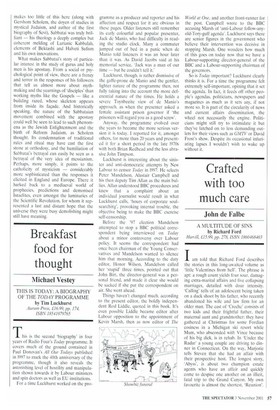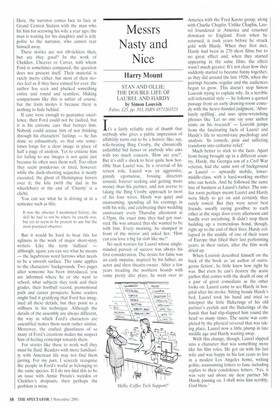Crafted with too much care
John de Falbe
A MULTITUDE OF SINS by Richard Ford
Harv ill, f15.99, pp. 278, ISBN 1860468403
Iam told that Richard Ford describes the stories in this long-awaited volume as 'little Valentines from hell'. The phrase is apt: a rough count yields four sour, damaging extra-marital affairs and five collapsing marriages, detailed with dour intensity. 'Calling' tells of an adolescent being taken on a duck shoot by his father, who recently abandoned his wife and law firm for an older man. The cast of 'Creche' consists of two kids and their frightful father, their maternal aunt and grandmother: they have gathered at Christmas for some Fordian cosiness in a Michigan ski resort while Mum, who absconded with Vince because of his big dick, is in rehab. In 'Under the Radar' a young couple are driving to dinner in Connecticut, On the way, Marjorie tells Steven that she had an affair with their prospective host. The longest story, 'Abyss', is about two champion estate agents who have an affair and quickly come to despise one another on an illicit, fatal trip to the Grand Canyon. My own favourite is almost the shortest, 'Reunion'.
Here, the narrator comes face to face at Grand Central Station with the man who hit him for screwing his wife a year ago; the man is waiting for his daughter and is icily polite to the narrator, who cannot tear himself away.
These stories are not rib-ticklers then, but are they good? In the work of Chekhov, Cheever or Carver, with whom Ford is sometimes compared, the question does not present itself. Their material is rarely merry either, but most of their stories feel as if they have existed for ever: the author has seen and plucked something entire and round and seamless. Making comparisons like this is unfair of course, but the form invites it because there is nothing to hide behind.
If care were enough to guarantee excellence. then Ford could not be faulted, but it is his extreme care that betrays him. Nobody could accuse him of not thinking through his characters' feelings — he has done so exhaustively, so that one sometimes longs for a clear image in place of half a page of analysis. Yet to criticise him for failing to use images is not quite just because he often uses them well. Too often they seem ponderous or tired, however: while the duck-shooting sequence is neatly executed, the ghost of Hemingway hovers over it; the kite (with the dad in his wheelchair) at the end of 'Charity' is a cliché.
You can see what he is driving at in a sentence such as this:
It was the absence I mentioned before, the skill he had to not be where he exactly was, but yet to seem to be present to any but the most practiced observer.
But it would be hard to beat this for ugliness in the work of major short-story writers. Like the term `dalliant' — although, again, you can see what he means — the lugubrious word furrows what needs to be a smooth surface. The same applies to the characters' backgrounds. Two pages after someone has been introduced, you are informed where he or she went to school, what subjects they took and their grades, their football record, promotional path and career prospects. Some readers might find it gratifying that Ford has imagined all these details, but they point to a stiffness in his technique. Although the details of the assembly are always different, the way in which Ford's characters are assembled makes them seem rather similar. Moreover, the crafted ghastliness of so many of Ford's creations makes me suspect him of feeling contempt towards them.
For stories like these to work well they must be fluid. Readers with more familiarity with American life may not find them jarring. For my part, I scarcely recognise the people in Ford's world as belonging to the same species. If! do not find this to be an issue with Annie Proulx's weirdos or Chekhov's dropouts, then perhaps the problem is mine.



















































































 Previous page
Previous page